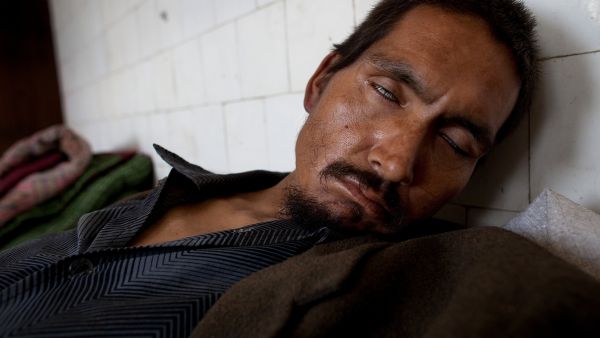A rehabilitated drug user tells his story
Abu Hilal was just another teenager with a loving family, excellent grades at school, great enthusiasm for sports and a regular mosque-goer. Then at 14, everything changed for the young Omani. He began playing truant at school, smoking and drinking beer and soon the downward spiral led him to drug abuse and by 16 he had gone to jail twice.
Last week Abu Hilal, who is now 30 and has successfully been drug-free for two years, joined an event held by Al Hayat Association for drug prevention. The association aims to help him and others like him deal with the consequences of drug addiction.
Although the evening celebrated the association's launch, it was candid in its message about the harsh realities of drug addiction. A short film was screened, titled A Mother's Cry, with narratives from a recovered heroin addict, a current addict and the harrowing story of a mother of three addicted sons.
Later Abu Hilal, who had featured in the film, told his own story to TheWeek. After a normal childhood, at 14 he began to feel emotiona-lly weak and broken. At the time, he couldn't understand why, although he now recognises he was suffering from depression. "I started losing interest in school," he said. "If you start running away from school, you're bound to meet the wrong people. That's when I began smoking and drinking beer. When I did these things, I believed I was strong."
He then became the leader of a gang and got into fights, and by the time he was 16, he had been in jail twice. "Those incidences made me feel worse about myself and weaker," he said. For a while, he went back to his old lifestyle and began playing sports. He made a new friend who he considered a good influence on him, but this friend began taking drugs. Abu Hilal was still suffering from depression and in addition he had experienced rejection from a girl he believed he loved. "The gang formed again," he said. "I started drinking again. After one year, I was with a friend and he said I seemed like someone who smokes hashish. He gave me hash and told me it will take away my problems.
"We forgot ourselves. It seemed like we were somewhere other than Oman because drugs were so easily available. We began selling and I was using hash, alcohol and pills."
After a while, his parents suspec-ted something was not right. To avoid telling them the truth, Abu Hilal made an extravagant act that he was possessed by the devil, playing on their superstitions. The act worked and they took him to a local witchdoctor who tried to expel the possession from him by whipping and beating him. This did not have the effect they had hoped, so they took him to Africa where they thought he might improve. "I was there for seven months, but it didn't do any good. I was smoking hash there. I was getting treatment at a hospital, but after it I couldn't eat or even walk and I was always getting headaches."
Once back in Oman, he returned to the gang. His best friend was jailed, and Abu Hilal was constantly avoiding being caught himself. At 19 years old, he went to Saudi Arabia for rehabilitation, where he stayed for four years. He felt as though he'd changed his life for the better. "But once I returned to Oman, I felt like I had no support. I felt like I had a problem. Every kind of lifestyle I had, I was always facing a problem. I wanted to get married but no-one would accept me because of my past," he said.
"Then I began taking and dealing in drugs again. The pain I was feeling made me smoke more. I hadn't wanted to go back to drugs.
"Hash began to be ineffective. It made me think too much. All of my friends were using heroin, so I was used to seeing it. I tried it once through smoking and became addicted instantly."
In the next seven years, Abu Hilal's addiction grew and he went to jail four times and ended up hospitalised for an overdose. "After I got out of hospital, I started using heroin again. I'd be taking it every chance I got. If I didn't get it, I couldn't eat or sleep. I didn't know if it was hot or cold. I couldn't do anything.I would trick my mum into giving me money or take it when she wasn't around, promising I would pay her back. I lost a lot of weight and had become very weak."
He had to leave his job as a store clerk and started selling his things to get money, but eventually he didn't have anything left to sell.
"In the end, I was very lonely. I tried many times to give up. I kept going to hospital but every time I got back into drugs. When I stopped, I felt my whole body was in pain, I felt very sad and very weak. I felt alone. I just kept going back to the same friends, so I came back to using. I knew inside that drugs weren't helping my problems and were actually making them worse."
The worst problem, he said, was not the physical pain but the emotional pain. In the end, he realised he'd lost everything and that he had to change. He was 28 and hadn't done anything positive with his life.
Abu Hilal went to Saudi Arabia again for treatment. He eventually managed to break the habit and has now been clean for the last two years. "Every day is important. I'm still living in a hard situation. If you've used drugs, people don't trust you. People think I'm not good."
Now, he works as a factory mana-ger for his father, but he had to work extremely hard to achieve the trust and support from his family. "I had to prove myself." He also feels he has a valuable contribution to make tow-ards the treatment of drug addicts. "The way people deal with drug addicts is a mistake. They are too hard on them and need to treat them with more care. I don't want to blame people, but someone recovering from drug addiction needs support."
He feels that many doctors aren't properly equipped do deal with drug abusers. "They should use ex-addicts to help them know how to deal with the patients. We are the ones who understand what it means to be addicted to drugs." He has already begun speaking to youths in schools. "I tell them I was young like them and I was thinking drugs would make me happy and strong, but they only made me miserable and weak."
Al Hayat Association hopes to reflect this sentiment by incorporating into their team both medical experts and those who have experienced drug abuse personally or through family or friends. They hope stories like Abu Hilal's will educate and serve as a deterrent to young Omanis.
Commenting on the film, Baidha al Sikaiti, the head of public relations for Al Hayat, said, "These stories really wake people up. We needed to show that reality to people because unless you see it, you'll never understand."
By Victoria Cuthbert








